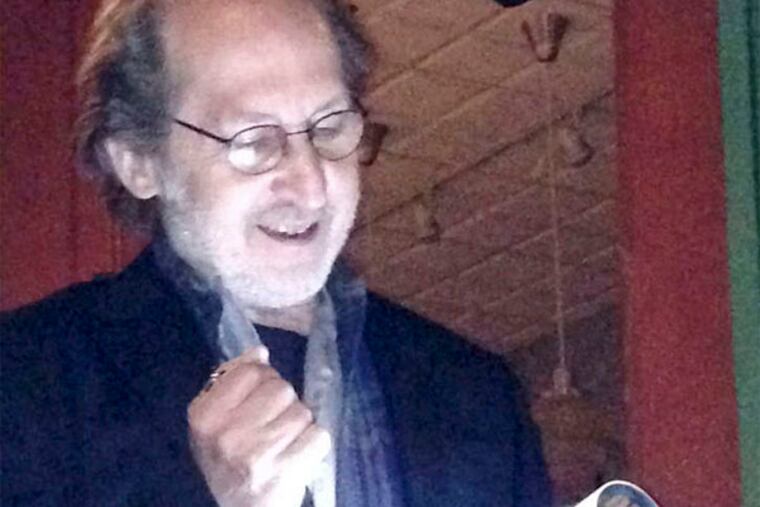Philadelphia, a town that 'gets' poetry, welcomes Poetry Day
This city gets it. Poetry suits our personality: forthright, outspoken, political. We get to the meat of things. So does poetry.

This city gets it. Poetry suits our personality: forthright, outspoken, political. We get to the meat of things. So does poetry.
At least, Kathleen Volk Miller, the editor of Painted Bride Quarterly, thinks so. Philadelphia's love of poetry is so strong, she says, that "people are out of their houses, out of their sweatpants, out in the cold, all to hear some random strangers read, and they don't even know if it's going to be good."
Perhaps that's what makes National Poetry Month - also known as April - a repeated success in this city. During the next four weeks, poets, writers, and readers have organized nearly nonstop readings, discussions, parties, festivals, and workshops to satisfy every interest, age, and neighborhood.
Why get out there and be part of it? Larry Robin, the force behind Robin's Books and Moonstone Arts Center, says, simply: "Good poetry is truth." More than that: "It's magic."
Imagine a whole day of back-to-back-to-back poets, reading for three minutes each. That's Poetry Ink, 100 poets reading, an entire day of verse. Founded by Robin, the 19th annual event happens on Sunday, April 26. It ensures that attendees "will hear other voices, ones that they wouldn't normally hear," Robin says. "We kind of trick you into hearing more . . . hoping you'll realize there's all kinds of ways of expressing yourself."
Imagine Philly Poetry Day - April 18. Leonard Gontarek, Philadelphia poet and founder of Philly Poetry Day, would like to see more people expressing themselves through poetry.
"I always want to engage and extend the audience," Gontarek says. He says poetry is not just for the educated few - "it's for everyone, especially the people who will be surprised that it's for them at all." He acknowledges that people are getting "their hit" through pop, rap, and hip-hop, but Gontarek wants more. He wants the poets in this city to feel excited and be recognized. He wants readings outside of the CVS and on the subway.
For a day, at least, Gontarek will fulfill most of these desires. On Philly Poetry Day, he and others have organized readings across the city. They'll happen in front of one of Charles Bukowski's old apartments, at a train station, in a library where a poet will read haikus to people in the elevator. And so on.
Maybe all it takes is one poem to change a mind. Poetry was never exactly something Peter LaBerge thought he could do, until one fateful year when his "godawful poem" was published in his high school literary magazine.
"I thought, 'Maybe I'm good at this,' " says LaBerge, a sophomore in the University of Pennsylvania's English program. So LaBerge dove headlong into starting his own literary magazine, The Adroit Journal, in high school, and hasn't looked back.
For LaBerge, poetry is important because of its "emotional openness," which can challenge, and sometimes dispel, a reader's prejudices or assumptions. As a teenager, LaBerge was able to explore himself through poetry, and now says the medium can serve many roles for other young people.
Greg Corbin, founder of the Philadelphia Youth Poetry Movement (PYPM), is keenly aware of poetry's influence. Founded in 2006, PYPM is based on the idea that writing can provide a safe space for young people and an opportunity to share stories and experiences without fear of judgment. "Once you find value in your voice," Corbin says, "you find value in yourself."
Poetry also gives youth a tool of communication, Corbin says: It's a "vehicle to win scholarships, advance their career, and get involved in the community as social change agents or educators."
At the Philadelphia Poetry Festival - another Gontarek brainchild, now run by the insanely wonderful Mad Poets Society - more than 25 organizations will give visitors a taste of what they do and how they do it.
"There's so much out there," says Eileen D'Angelo, founder of Mad Poets Society, "and the festival helps you figure it all out. You're going to find all kinds of poetry out there, but you're also going to find things you connect with."
Once that connection is made, "three minutes can change your life or your view on a subject," according to Christopher Brown, the brains behind Poetry 247 and frequent host of readings and discussions across the city. He says poets often can put into words thoughts "we didn't even know we were having."
"We remember things in meter and rhyme," according to Richard Bank, poet, author and host of Mad Poets Society's seasonal bonfire readings, "because poetry was the original form of communication, long before writing.
"Poetry has been with us for so long," Bank says, "just like a little poodle with ribbons in its ears turning around three times before lying down at night."